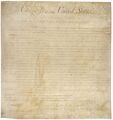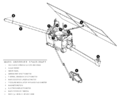Template:Selected anniversaries/September 25: Difference between revisions
No edit summary |
No edit summary |
||
| Line 13: | Line 13: | ||
||Christoph Gudermann (d. September 25, 1852) was a German mathematician noted for introducing the Gudermannian function and the concept of uniform convergence | ||Christoph Gudermann (d. September 25, 1852) was a German mathematician noted for introducing the Gudermannian function and the concept of uniform convergence | ||
||1866 – Thomas Hunt Morgan, American biologist, geneticist, and embryologist, Nobel Prize laureate (d. 1945) | ||1866 – Thomas Hunt Morgan, American biologist, geneticist, and embryologist, Nobel Prize laureate (d. 1945). | ||
||Stefan Mazurkiewicz (b. 25 September 1888) was a Polish mathematician who worked in mathematical analysis, topology, and probability. He will be known for the Hahn–Mazurkiewicz theorem, a basic result on curves prompted by the phenomenon of space-filling curves. Pic. | |||
File:Harald Cramér.jpg|link=Harald Cramér (nonfiction)|1893: Mathematician and statistician [[Harald Cramér (nonfiction)|Harald Cramér]] born. He will help found probability theory as a branch of mathematics, writing in 1926: "The probability concept should be introduced by a purely mathematical definition, from which its fundamental properties and the classical theorems are deduced by purely mathematical operations." | File:Harald Cramér.jpg|link=Harald Cramér (nonfiction)|1893: Mathematician and statistician [[Harald Cramér (nonfiction)|Harald Cramér]] born. He will help found probability theory as a branch of mathematics, writing in 1926: "The probability concept should be introduced by a purely mathematical definition, from which its fundamental properties and the classical theorems are deduced by purely mathematical operations." | ||
Revision as of 17:50, 23 March 2018
1644: Astronomer and instrument maker Ole Rømer born. He will make the first quantitative measurements of the speed of light.
1789: The United States Congress passes twelve amendments to the United States Constitution: The Congressional Apportionment Amendment (which was never ratified), the Congressional Compensation Amendment, and the ten that are known as the Bill of Rights.
1819: Mathematician and Anglican theologian George Salmon born. He will work in algebraic geometry for two decades, then devote the last forty years of his life to theology.
1845: Judge Havelock With Glass is "a reasonably accurate depiction of events as I experienced them," according to the Judge.
1893: Mathematician and statistician Harald Cramér born. He will help found probability theory as a branch of mathematics, writing in 1926: "The probability concept should be introduced by a purely mathematical definition, from which its fundamental properties and the classical theorems are deduced by purely mathematical operations."
1992: NASA launches the Mars Observer, a $511 million probe to Mars, in the first U.S. mission to the planet in 17 years. The probe will fail eleven months later.
2002: Steganographic analysis of Humpty Dumpty At Bat reveals previously unknown biography of Babe Ruth by Lewis Carroll.
2003: Journalist, writer, literary editor, and actor George Plimpton dies.
2017: Dennis Paulson of Mars says that the twenty-fifth anniversary of the launch of the Mars Observer is a bittersweet event, because the spacecraft will be lost eleven months later.








